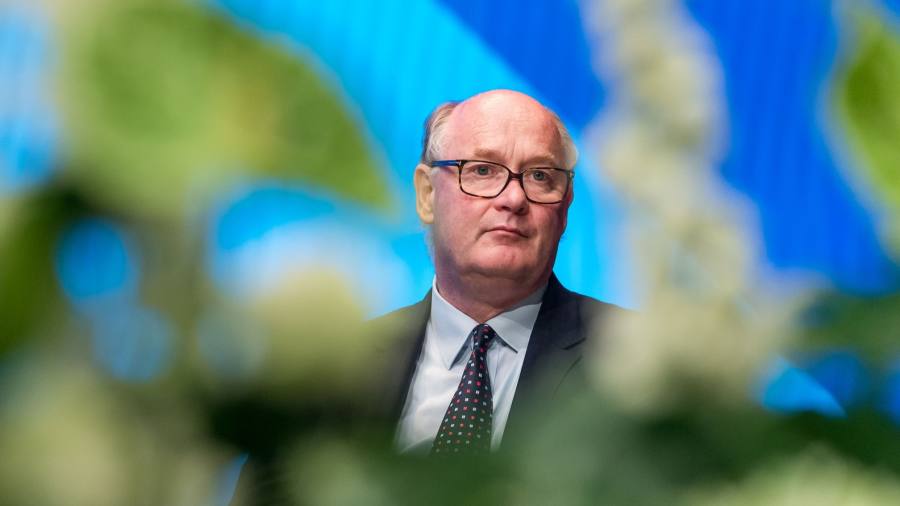
Receive free Financial services updates
We’ll send you a myFT Daily Digest email rounding up the latest Financial services news every morning.
When the chancellor makes his Mansion House speech next week, the glamorous world of pensions will take top billing. The UK government wants to harness pension savings to invest in infrastructure and rejuvenate the economy and stock market.
There will be another topic on the agenda, too: one that is fundamental to the City of London’s push to modernise, to become more attractive to large global issuers and more user-friendly for retail investors. Despite multiple reports and reviews it has remained unaddressed, with change blocked by vested interests, for decades.
The outcome of Sir Douglas Flint’s review into digitisation of the UK’s shareholding system will have to grapple with the legacy of past failures. When the London Stock Exchange’s Taurus electronic settlement project collapsed in 1993 it was dismissed as “one of the outstanding examples of technological ineptitude of our times”. The project, part of which became the wholesale system Crest, aimed to end the use of paper share certificates for all investors in a company.
Thirty years later, the UK is still trying to do that — overtaken by markets in Europe and around the world. How many individual investors hold paper share certificates is a matter of debate. One oft-cited estimate reckons 10mn people. Another puts the total at 8.6mn certificates, many held by the same investors and about half of which are in just five companies.
Either way, the remaining stock of these paper relics is shrinking year on year. The vast majority of retail investors now hold shares through nominee accounts (in “dematerialised” or electronic form) provided by platforms such as Hargreaves Lansdown. Those opting for paper constitute a small sliver of the equity of most big issuers.
This paper tail wags a costly, inefficient dog of a system — where issuers pay millions to registrars such as Equiniti or Computershare to administer a physical shareholder register in addition to the electronic one. This in turn leads to a variety of paper-based processes and communications, which are both inefficient and wasteful.
One problem is that this question about one legacy paper product bleeds into other issues, such as Marks and Spencer chair Archie Norman’s campaign to digitise communications with investors and his, somewhat controversial, push for digital annual meetings.
To qualify as a success, Flint’s review must allow the UK to eliminate paper share certificates over time, enable a direct and fruitful relationship between issuers and investors in both directions, and remove the deadweight costs for issuers that the current system involves.
There are broadly three options here. Ireland’s approach, dubbed “dematerialisation in name only”, has been widely criticised for taking the first steps to scrapping paper certificates but without reforming the system to reap wider benefits. Meanwhile, Australia’s project to build a flashy new clearing and settlement system using blockchain collapsed last year at huge cost, providing a warning of the dangers of an untested approach.
The most sensible alternative seems to be one likely to produce a better outcome for issuers and investors in the near future. Companies have the power to drill into their shareholder base through section 793 of the Companies Act. A souped-up version of a 793 “sweep” could give issuers information about their ultimate owners more quickly, cheaply and regularly. Meanwhile, rethinking the shareholder rights directive, which encourages engagement and transparency, could put the obligation on to investment platforms to ensure communications flow smoothly between issuer and end investors, and that the latter have full access to ownership rights, such as voting.
Not everyone would be happy. The compromise is that shareholders who used to have paper certificates would no longer have their name on the company register, but would appear through nominee accounts — something that should matter less as the rights and benefits of direct ownership are made more widely available. The registrars would have to reinvent their businesses, perhaps as providers of outsourced secretarial or custodial services.
In the future, open banking-style data sharing by investors could spark innovation in new fintech services for retail investors. A form of digital ID has helped market reform in the likes of Singapore and Sweden, where 22 per cent of households own stocks and shares compared with 11 per cent in the UK according to think-tank New Financial.
There will be much talk next week about improving London’s competitiveness, and boosting participation in equity markets. Finally, belatedly, overhauling an archaic, inefficient system is a good first step.